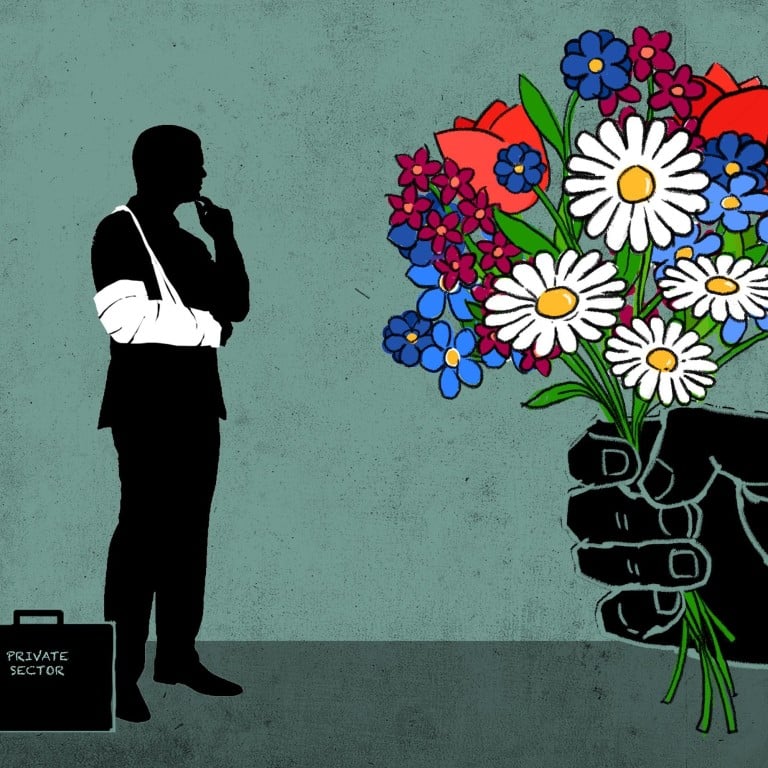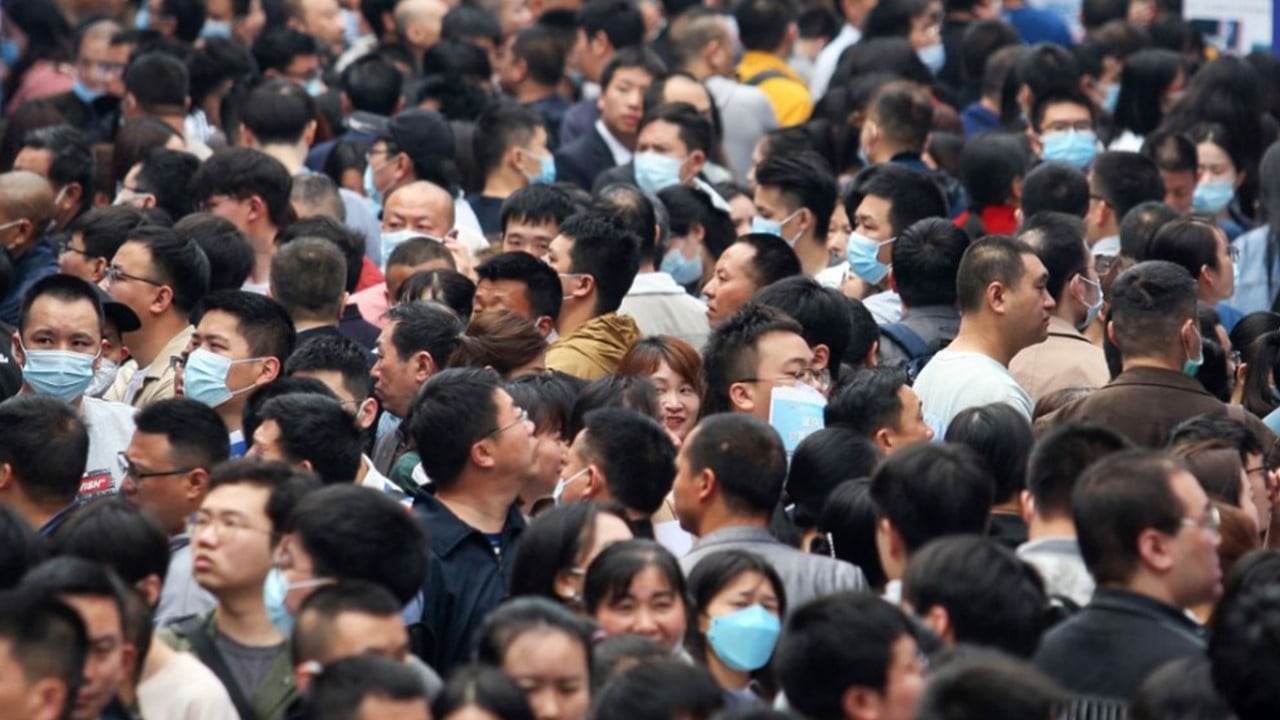
China has a 31-point plan for private sector to kick-start economy. But are bruised business owners buying it?
- After years of regulatory clampdowns and Covid curbs, China’s battered private sector is being urged to step up to the plate as the economy falters
- Despite top entrepreneurs’ chorus of support for 31-point action plan from Beijing, smaller business owners are ‘not sure it will make any difference’
The wide-ranging plan showed the top leadership “cared” about the private economy, they chorused, asserting how “confident” they were about the future of the private sector.
It was unclear whether they spoke from the heart. As members of China’s political system, they are required to toe the official line.
In any case, they did convey a clear message from Beijing. With the economy losing steam, the government was relying on the private sector to lead the post-pandemic recovery, and underpin both jobs and technological innovation at a time of increasing tensions between China and the US-led West.
“We will pull out all stops to follow the direction of the guideline,” billionaire businessman Cheng Wei, founding chairman and CEO of Didi Chuxing, a mobile transport platform, told Communist Party mouthpiece People’s Daily.
“We will play an active role in creating jobs, expanding consumption and sharpening [our] edge in international competition, making the company bigger, better and stronger.”
Will new action plan give backbone of China’s economy the wings to fly higher?
However, the stock markets did not appear to buy Beijing’s rhetoric. The Shanghai and Shenzhen indices fell for three straight days after the guideline was released late on July 19.
Entrepreneurs reached by the South China Morning Post said they were less than convinced by Beijing’s pledges in the guideline, and would wait for concrete measures to be taken at local levels.
Analysts, meanwhile, called for an end to official “discrimination” against privately owned companies, though one observer feared the “shackles” were likely to stay on.
Jason Liu, a cement company owner in the eastern province of Anhui, did not have high hopes for the action plan.
“The guideline touched on chronic problems, such as market entry barriers and financing difficulties,” Liu said. “These are problems the authorities have vowed to tackle for decades. Yet they remain unresolved. I’m not sure it will make any difference this time.”
The new guideline is the most comprehensive one to be released by Beijing since President Xi Jinping started his historic third presidential term in March.
“Until significant changes really take place, I’ll just muddle along.”
China’s private economy accounts for more than 60 per cent of the national gross domestic product, more than 70 per cent of technological progress, and more than 80 per cent of the urban workforce, according to official data.
However, the sector is discriminated against in terms of resource allocation and market access, and has always ranked lower than state-owned enterprises (SOEs) in the economic pecking order, as the ruling party relies on the state sector to wield influence on political, economic and social fronts.
The private economy was also battered over the past three years by a spate of regulatory clampdowns, focused mainly on internet technology companies, property developers and private education firms, as Xi called to “rein in the blind expansion of capital”.
The crackdowns, which wiped out trillions of US dollars in market value, coincided with stringent anti-pandemic curbs under China’s “zero-Covid” approach – leading to large-scale business collapse and unemployment.
Business confidence was further dampened by major social media influencers fanning the flames of online antagonism towards private firms, in reaction to Beijing’s “common prosperity” drive aimed at narrowing the wealth gap.
Nationalistic blogger Sima Nan banned from Chinese social media
“[Even] in China’s heavily censored internet world, hostile voices against the private economy were not silenced. It showed Beijing’s tolerance [of such sentiments],” Liu said. “Although President Xi called private entrepreneurs ‘people on our own side’ [at the annual legislative meetings] in March, it will take time for us to regain confidence.”
Signs of a policy change from a state-led model became evident late last year, as China doubled down on reviving its Covid-hit economy.
Addressing the party’s annual economic work conference in December, Xi said China would revise rules and regulations to reduce market entry barriers and encourage local governments to serve private firms better.
During the annual meetings of the national legislature and top political advisory body in March, Xi once again sought to reassure the private sector, as recounted by Liu.
“The private sector is an important force for our party to govern in the long term,” Xi told advisers to Beijing representing private businesses. “We always regard private enterprises and private entrepreneurs as people on our own side.”
John Wang, an agribusiness company owner in the central province of Hunan, said the biggest risk to the private sector was unpredictable and inconsistent policymaking.
“I’m glad the guideline says that the properties of private companies and the legitimate rights and interests of entrepreneurs would be better protected,” he said.
“But it stops short of addressing the relationship between government policy and law. In the real business world, in many instances, policy overrides law.”
Wang said the local government forced him to close his fertiliser factory last year because its location near a river allegedly posed an environmental risk.
The same local government had pushed him to build the facility six years ago, because they were eager to meet investment targets. But when environmental protection became a key aspect for their performance evaluations, Wang found himself slapped with an administrative order to shut his factory.
This happened despite his making all the equipment upgrades needed to meet the government’s environmental standards, according to Wang.
“Under such circumstances, legal protection sounds like empty talk,” he said.
Wang is a deputy to the local city-level legislative body, but said his political identity had brought him very limited influence in policymaking or implementation.
“There is always a ‘correct’ official stance. Everyone just follows suit,” Wang said. “No one dares to be an outlier who disagrees with the mainstream opinion … the minority obeys the majority.”
China’s economic backbone, private firms decry lack of parity in policy support
The new 31-point action plan, jointly released by the party and the State Council, China’s cabinet, promises to “trust, unite, serve, guide and educate” private business owners as before, and “actively and prudently” develop party members from the sector.
It also includes a pledge to streamline the industry distribution of entrepreneur representatives in China’s legislative and political consulting bodies, and to encourage them to “play a bigger role” in international economic activities.
“I think it means that the party wants to absorb more members from emerging hi-tech sectors and phase out those from sunset industries,” Wang said. “It’s not about generally elevating the political status of private entrepreneurs.”
Fred Zhang, a factory owner in eastern Jiangsu province, welcomed the plan’s emphasis on cultivating “a cordial and clean relationship between government and business”.
“Local government has been a big headache to me,” Zhang said. “I think the best they can do is just leave us alone.”
Zhang said his local government, which he would not identify for fear of retaliation, had introduced a slew of policies in recent years requiring companies to go through various costly and time-consuming licensing procedures.
“Local officials told me the third-party licensing requirements were aimed at better quality assurance. However, officials would not be held accountable if anything bad happened.”
They had also been keen to set up government-controlled business groups in sectors ranging from grain and oil trade, to water treatment and tourism, Zhang said.
These business groups were set up to make the state sector bigger and stronger, in response to the party’s repeated calls, Zhang was told.
“They have turned out to be strong competitors to private companies in the sense that they get our people. Many young people prefer stable and easy jobs in government-affiliated companies,” he said.
‘Outstanding people’: China to give private sector more say as economy falters
In its latest action plan, Beijing has vowed to change the status quo, with all regions and departments prohibited from setting up market entry barriers such as authentication or licensing. Administrative approvals will be streamlined and better regulated, and a level playing field created so that all companies are treated equally.
But Zhang remained sceptical. “When governments have their own companies, I can’t see how private companies will ever be treated equally,” he said.
“After all, the constitution stipulates the SOEs’ dominance in China’s economic system, while the private economy is just a complement.”
China’s private companies will continue to dance with shackles on
“China needs entrepreneurship [now] more than at any other time,” Liu – a former member of China’s top political advisory body – told a forum in Beijing late last month. “There is no need to categorise companies based on their ownership. We should make breakthroughs in eliminating ownership discrimination.”
However Chen Daoyin, an independent political scientist and former Shanghai-based professor, said it was unlikely such categorisation would be dropped.
The party made it clear during the 15th national congress in 1997 that the public sector controls the lifelines of the national economy and plays a leading role in economic development, setting the tone for the positions of the two sectors, Chen said.
The congress of September 1997 came a few months after the death of paramount leader Deng Xiaoping – the leader of China’s reform and opening up drive since the late 1970s – and set the tone for the relationship between private and public ownership in China.
“It’s up to the party to define which industries are ‘lifelines’. Traditionally they include petroleum, electricity, roads and railways, and so on. In recent years, digital financial services, culture and other industries concerning ideology have been added to the list,” Chen said.
“The new guideline responds to the urgent needs of reviving the economy and helping the country survive the rivalry with the West. However, the tone is consistent with the past – the party will encourage, support and guide the development of the private sector, among which ‘guiding’ is the dominating theme,” he said.
“It means China’s private companies will continue to dance with shackles on.”


